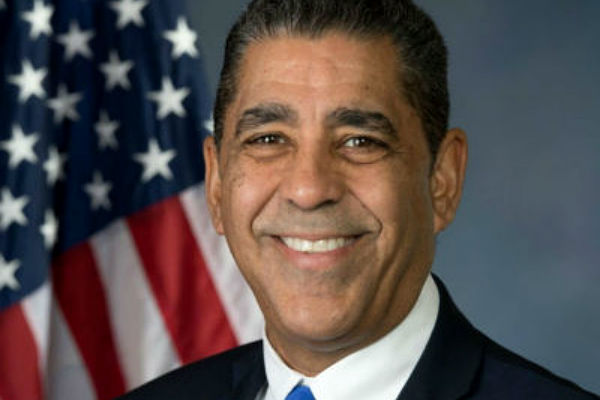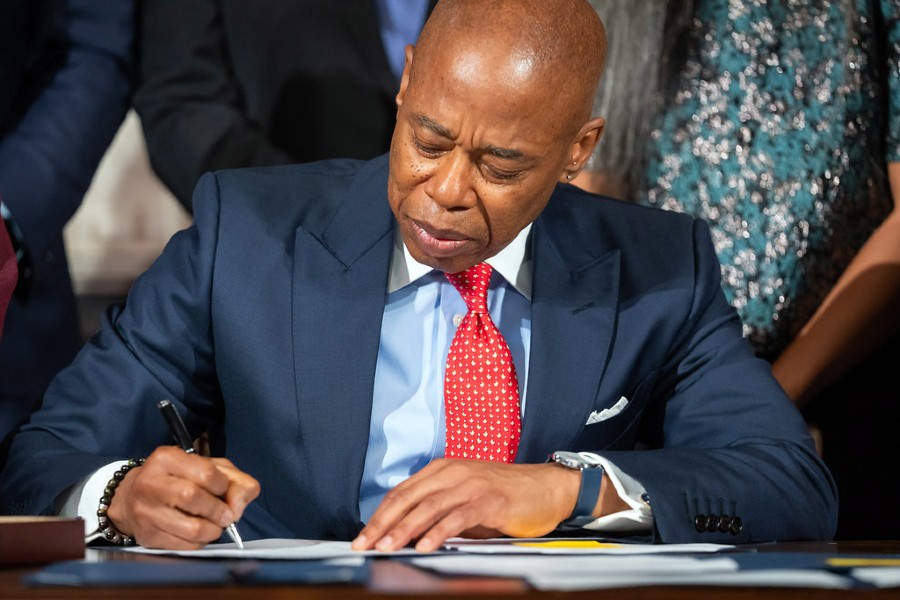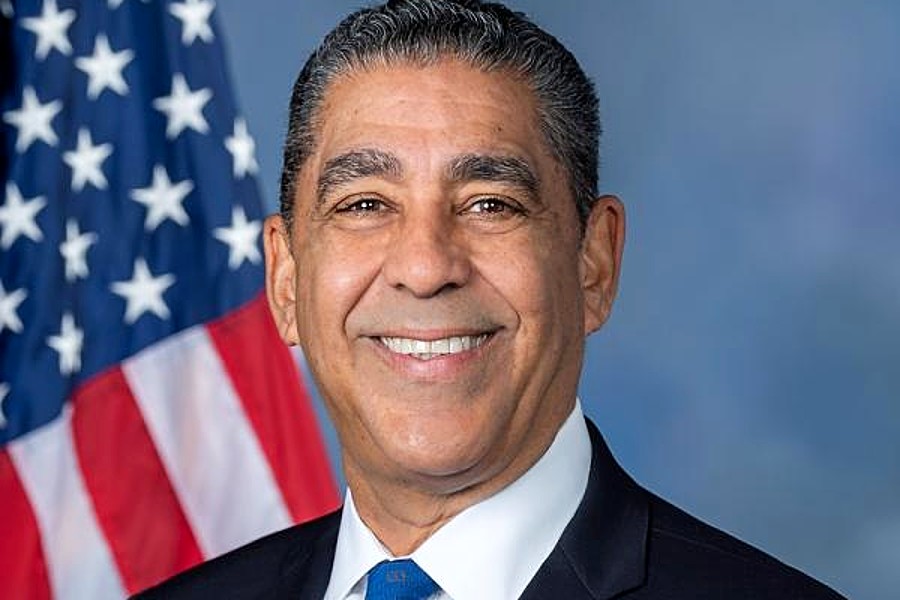 Today, New York Representatives Adriano Espaillat, Carolyn B. Maloney, and Nydia Velázquez led a bipartisan group of 15 New York Delegation members
Today, New York Representatives Adriano Espaillat, Carolyn B. Maloney, and Nydia Velázquez led a bipartisan group of 15 New York Delegation members
in requesting that House and Senate leadership provide “robust emergency relief” to the MTA in the next COVID-19 response legislative package.
The Members wrote, “Nothing short of immediate and substantial financial assistance will prevent the MTA from undertaking devastating service cuts and fare hikes to address the $12 billion need of the MTA […] These reductions in service would paralyze New York Metro Area commuters by adding up to several hours to riders’ travel times. Moreover, these policy changes would force more riders onto fewer trains, compromising social distancing protocols, and further increasing the risk of heightened COVID infection rates throughout the region. The significant hikes in fares and tolls would disproportionately harm low-income communities and those who have already been hit the hardest economically by this pandemic. These changes, though necessary to keep the MTA alive, would be absolutely catastrophic for the New York metropolitan region.”
They go on to explain, “[s]ince the beginning of the COVID-19 pandemic, the MTA has been essential in combatting this disease. New York City was able to overcome the first wave of the pandemic thanks to the MTA’s 75,000 employees and the continued operation of its subways, buses, and railroads. As the third wave of the pandemic sweeps the nation, the MTA’s service remains the linchpin of New York City’s response, with the City continuing to rely on it to transport essential staff – including medical professionals, first responders, essential government employees, and childcare workers – to where they need to be. Ensuring that MTA remains fully functioning is not just a priority for New York State and the New York Metropolitan region, but also for the nation.”
Co-signing the letter are Representatives Jerrold Nadler (NY-10), Thomas R. Suozzi (NY-3), Hakeem S. Jeffries (NY-8), Peter T. King (NY-2), Max Rose (NY-11), Eliot L. Engel (NY-16), Grace Meng (NY-6), Alexandria Ocasio-Cortez (NY-14), Yvette D. Clarke (NY-9), José E. Serrano (NY-15), Kathleen M. Rice (NY-4), Lee Zeldin (NY-1), Elise Stefanik (NY-21), Gregory W. Meeks (NY-5), and Brian Higgins (NY-26).
Full text of the letter below:
 Dear Speaker Pelosi, Leader McConnell, Leader Schumer, and Leader McCarthy,
Dear Speaker Pelosi, Leader McConnell, Leader Schumer, and Leader McCarthy,
As negotiations continue on additional pandemic relief legislation as well as on FY 2021 appropriations legislation, we appreciate funding included for Metropolitan Transportation Authority (MTA) in prior relief legislation and ask that you also include robust emergency relief in whichever legislative initiative is brokered first. Nothing short of immediate and substantial financial assistance will prevent the MTA from undertaking devastating service cuts and fare hikes to address the $12 billion need of the MTA. Supported by the recent Rudin Center for Transportation report, these cuts would cripple the New York region’s economy — which accounts for over 8% of the national Gross Domestic Product (GDP) — resulting in over 450,000 jobs lost by 2022, a $50 billion reduction in annual earnings, and a $65 billion loss in GPD. Congress must act before the MTA’s operational changes irreparably harm the New York City community and way of life.
As you know, the MTA is currently experiencing its greatest financial crisis ever in its 55-year history due to the COVID-19 pandemic, of which New York City was the epicenter for several months. The MTA faces a $12 billion deficit and record-low ridership across the board; commuter rail ridership is down 74%, bus ridership is down 49%, and subway ridership is down 67% from November 2019 levels.[1] In order to remain operational, the MTA Board of Directors plans to lay off more than 9,400 employees, implement a 40% reduction across all subways, significantly reduce bus services, and implement a 50% cut in services along Long Island Rail Road and Metro-North. Furthermore, they intend to raise tolls and fares by 4-6%, which is an even more drastic measure than what they put forth in their “Doomsday Scenario” announced in August.
These reductions in service would paralyze New York Metro Area commuters by adding up to several hours to riders’ travel times. Moreover, these policy changes would force more riders onto fewer trains, compromising social distancing protocols and further increasing the risk of heightened COVID infection rates throughout the region. The significant hikes in fares and tolls would disproportionately harm low-income communities and those who have already been hit the hardest economically by this pandemic. These changes, though necessary to keep the MTA alive, would be absolutely catastrophic for the New York metropolitan region.
Since the beginning of the COVID-19 pandemic, the MTA has been essential in combatting this disease. New York City was able to overcome the first wave of the pandemic thanks to the MTA’s 75,000 employees and the continued operation of its subways, buses, and railroads. As the third wave of the pandemic sweeps the nation, the MTA’s service remains the linchpin of New York City’s response, with the City continuing to rely on it to transport essential staff – including medical professionals, first responders, essential government employees, and childcare workers – to where they need to be.
Ensuring that MTA remains fully functioning is not just a priority for New York State and the New York Metropolitan region, but also for the nation. The MTA is the largest public transit system in the United States and represents 38% of total passenger trips among all U.S. public transit agencies.[2] Furthermore, the MTA brings millions in revenue to states nationwide through contracts and equipment purchases, and a lack of federal assistance to MTA will send shockwaves through state and local economies across the nation.
We sincerely thank you for the $4 billion for the MTA included in the CARES Act, which was critical in helping New York City to overcome the first wave of the pandemic. However, the situation has become more dire than ever. The Metropolitan Transportation Authority is the lifeblood of New York City, and the desperate financial situation that MTA is in puts every single one of New York City’s nearly nine million residents at risk. On behalf of our constituents, we implore you to provide immediate federal assistance to MTA, whether that be as part of the FY21 appropriations package, the next pandemic relief omnibus, or a continuing resolution.
We thank you for your attention to this matter, and for your work on behalf of the nation during this crisis.
First elected to Congress in 2016, Rep. Adriano Espaillat is serving his second term in Congress where he serves as a member of the influential U.S. House Foreign Affairs Committee, the House Committee on Transportation and Infrastructure, and the House Small Business Committee.
He serves as a Senior Whip of the House Democratic Caucus and is a member of the Congressional Hispanic Caucus (CHC) where he also serves in a leadership role as CHC Whip.
He is also chairman of the CHC Task Force for Transportation, Infrastructure and Housing. Rep. Espaillat’s Congressional District includes Harlem, East Harlem, northern Manhattan and the north-west Bronx. To find out more about Rep. Espaillat, visit online at https://espaillat.house.gov/.
Photo credit: 1) Rep. Adriano Espaillat. 2) Nancy Pelosi.
Become a Harlem Insider!
By submitting this form, you are consenting to receive marketing emails from: . You can revoke your consent to receive emails at any time by using the SafeUnsubscribe® link, found at the bottom of every email. Emails are serviced by Constant Contact








